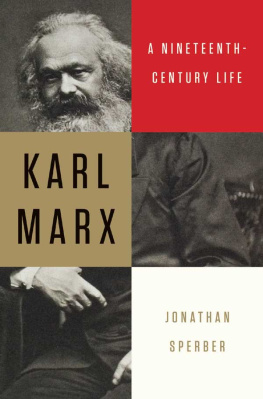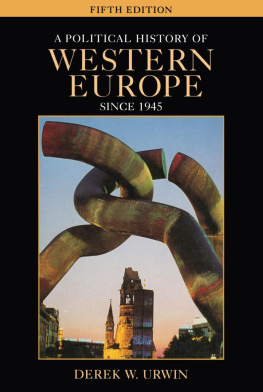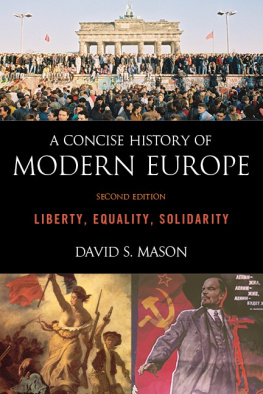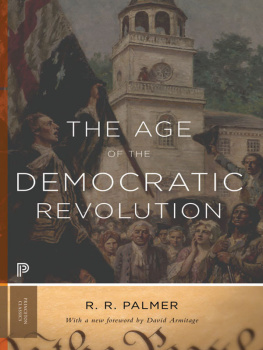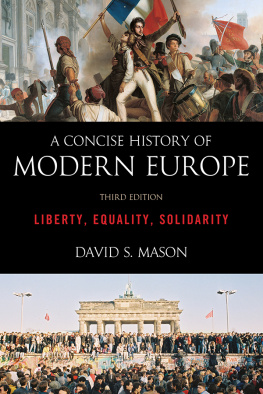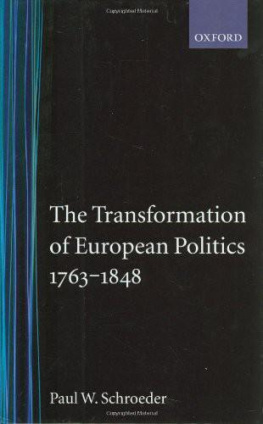Revolutionary Europe 17801850
Jonathan Soperbers Revolutionary Europe 17801850 is a history of Europe in the age of the French Revolution, from the end of the old regime to the outcome of the revolutions of 1848. Fully revised and updated, this second edition provides a continent-wide history of the key political events and social transformation that took place within this turbulent period, extending as far as their effects within the European colonial society of the Caribbean.
Key features include
- analyses of the movement from societys old regime of orders to a civil society of property owners; the varied consequences of rapid population increase and the spread of market relations in the economy; and the upshot of these changes for political life, from violent revolutions and warfare to dramatic reforms and peaceful mass movements
- a lively account of the events of the period and a thorough analysis of the political, cultural and socioeconomic transformations that shaped them
- a look into the lives of ordinary people amidst the social and economic developments of the time
- a range of maps depicting the developments in Europes geographic scope between 1789 and 1848, including for the 1820, 1830 and 1848 revolutions.
Revolutionary Europe 17801850 is the perfect introduction for students of the history of the French Revolution and the history of Europe more broadly.
Jonathan Sperber is the Curators Professor at the University of Missouri, USA. His previous publications include Karl Marx: A Nineteenth-Century Life (2013) and The European Revolutions 18481851 (2009).
Revolutionary Europe 17801850
Second edition
Jonathan Sperber

Second edition published 2017
by Routledge
2 Park Square, Milton Park, Abingdon, Oxon, OX14 4RN
and by Routledge
711 Third Avenue, New York, NY 10017
Routledge is an imprint of the Taylor & Francis Group,
an informa business
2000, 2017 Jonathan Sperber
The right of Jonathan Sperber to be identified as author of this work has been asserted by him in accordance with sections 77 and 78 of the Copyright, Designs and Patents Act 1988.
All rights reserved. No part of this book may be reprinted or reproduced or utilised in any form or by any electronic, mechanical, or other means, now known or hereafter invented, including photocopying and recording, or in any information storage or retrieval system, without permission in writing from the publishers.
Trademark notice : Product or corporate names may be trademarks or registered trademarks, and are used only for identification and explanation without intent to infringe.
First edition published by Pearson Education Limited 2000
British Library Cataloguing in Publication Data
A catalogue record for this book is available from the British Library
Library of Congress Cataloging in Publication D ata
A catalog record for this book has been requested
ISBN: 978-1-138-64347-5 (hbk)
ISBN: 978-1-138-64348-2 (pbk)
ISBN: 978-1-315-20970-8 (ebk)
Typeset in Sabon
by Deanta Global Publishing Services, Chennai, India
To the memory of David Wakefield scholar, teacher, colleague and friend
Contents
The Age of Revolution After 230 Years
The age of revolution in modern European history began in the decade of the 1780s, 230 years ago. It is now almost a quarter of a millennium old and showing its age, as a quick collage of images from the years 17801850 might suggest. Think of those periwigged and powdered revolutionaries singing the Marseillaise , taking an oath to conquer or die at the altar of the fatherland or raising trees of liberty. Then there is Napoleon, seen today on brandy bottles and remembered in not tonight Josephine jokes, which is more than many of his contemporaries, figures existing, if at all, on the pages of textbooks: Metternich, Peel, Mazzini. Social and economic developments of the time appear equally distant. The industrial revolution assuming there ever was such a thing, which many economists and historians now dispute with its large, bulky, smoky and coal-powered steam engines, looks more quaint than revolutionary in an age of microelectronics, nanotechnology and demands for curtailing carbon emissions. Accompanying industrialization was the rise of new forms of labour such as factory work, today globally in decline, overshadowed by service occupations, and not just in Europe and North America, but also in those twenty-first century manufacturing powerhouses China, India and Brazil. The famines and bread riots of pre-1850 Europe might seem relevant to circumstances in todays Africa or South Asia, but in much of the rest of the world, agricultural policy is more often about dealing with unmarketable food surpluses than seeking to rectify shortages.
For all that, it would be inappropriate to write off the age of revolution as completely remote and unconnected to the present. The bicentenary of the French Revolution in 1989 and the sesquicentenary of the 1848 revolutions in 1998 generated the full panoply of academic debate, with conferences, symposia, public lectures, journal articles, monographs and works of synthesis, the first edition of this book among them. A bit surprisingly, the commemoration of these revolutionary anniversaries led to a public response beyond the usual academic suspects also surprisingly, perhaps more for the 1848 revolutions than for that of 1789. Even more so, the revolutionary waves of 1989 in then-communist Europe and of 2011 in North Africa and the Middle East revived memories of the age of revolution and sometimes demonstrated its persisting long-term influences. These and other features of the past quarter-century have reflected back on the study of the age of revolution: the growing worldwide interconnections we commonly call globalization have led to the consideration of the global causes and consequences of the revolutionary era in Europe; ever more heated debates about the causes and nature of climate change have brought back into focus Thomas Malthuss ideas, first formulated in 1797, about the results of population growth.
So the revolutionary decades 17801850, if no longer current or familiar, are not entirely distant and alien either. Striking a balance between perceiving their closeness and their distance, noting the continuity between that time and the present or perceiving the discontinuity between then and now all underlie the general approach to be taken in this book. Of course, representing the past in terms of a balance between familiarity and distance, between continuity and discontinuity with the present, is typical of the historical enterprise more generally, but for each era being considered, the elements of the balance will differ and stand in a different relationship to each other. For revolutionary Europe, it seems to me that we can note continuity in form, but discontinuity of content. Politics was then, for the first time, understood as moving along a left-right spectrum, ranging from radicalism to liberalism and conservatism, as it is today, but each of these political tendencies had quite different meanings than they do in the present. Democracy and citizenship were important and contested ideals, but the understanding of democracy in the radical phase of the French Revolution or the nationalist conception of citizenship in the period of the Napoleonic Wars was quite distinct from at least some understandings of these ideals in the early decades of the twenty-first century. Feminism emerged as an aspiration towards the emancipation of women in the 1830s and 1840s, but the conception of emancipation held by feminists of the time was different from contemporary ones.
Next page

